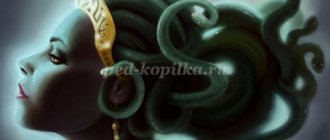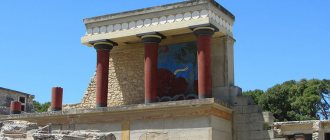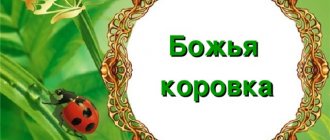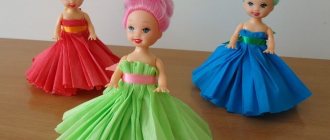The beginning of the world
Once upon a time, there was nothing in the Universe but dark and gloomy Chaos. And then the Earth appeared from Chaos - the goddess Gaia, powerful and beautiful. She gave life to everything that lives and grows on her. And everyone has since called her their mother.
The Great Chaos also gave birth to the gloomy Darkness - Erebus and the black Night - Nyukta and ordered them to guard the Earth. It was dark and gloomy on Earth at that time. This was until Erebus and Nyukta got tired of their hard, constant work. Then they gave birth to the eternal Light - Ether and the joyful shining Day - Hemera.
And so it went from then on. Night guards peace on Earth. As soon as she lowers her black covers, everything plunges into darkness and silence. And then it is replaced by a cheerful, shining Day, and everything around becomes light and joyful.
Deep under the Earth, as deep as one can imagine, the terrible Tartarus was formed. Tartarus was as far from the Earth as the sky, only on the opposite side. Eternal darkness and silence reigned there...
And above, high above the Earth, lies the endless Sky - Uranus. The god Uranus began to reign over the whole world. He took as his wife the beautiful goddess Gaia - the Earth.
Gaia and Uranus had six daughters, beautiful and wise, and six sons, powerful and formidable titans, and among them the majestic Titan Ocean and the youngest, the cunning Cronus.
And then six terrible giants were born to Mother Earth at once. Three giants - Cyclopes with one eye in their forehead - could frighten anyone who just looked at them. But the other three giants, real monsters, looked even more terrible. Each of them had 50 heads and 100 arms. And they were so terrible to look at, these hundred-armed giants, the Hecatonchires, that even their father himself, the mighty Uranus, feared and hated them. So he decided to get rid of his children. He imprisoned the giants deep in the bowels of their mother Earth and did not allow them to emerge into the light.
The giants rushed about in the deep darkness, wanting to break out, but did not dare to disobey the order of their father. It was also hard for their mother Earth, she suffered greatly from such an unbearable burden and pain. Then she called her titan children and asked them to help her.
“Rise up against your cruel father,” she persuaded them, “if you don’t take away his power over the world now, he will destroy us all.”
But no matter how much Gaia tried to persuade her children, they did not agree to raise a hand against their father. Only the youngest of them, the ruthless Cronus, supported his mother, and they decided that Uranus should no longer reign in the world.
And then one day Kron attacked his father, wounded him with a sickle and took away his power over the world. Drops of the blood of Uranus that fell to the ground turned into monstrous giants with snake tails instead of legs and vile, disgusting Erinyes, who had snakes writhing on their heads instead of hair, and in their hands they held lit torches. These were terrible deities of death, discord, revenge and deception.
Now the powerful, inexorable Kron, the god of Time, has reigned in the world. He took the goddess Rhea as his wife.
But there was no peace and harmony in his kingdom either. The gods quarreled among themselves and deceived each other.
Popular productions
Ancient Greek literature offers the world many interesting stories, much of which became the reason for the emergence of various common nouns denoting human character traits and behavioral characteristics. Famous gods and muses often appear in thematic theatrical productions. Children love to play the roles of such colorful characters and act out non-trivial mythical situations. As an example, here are three stories that are most often used in school plays.
Apollo and the Muses
The action of the work takes place on Mount Helikon, which stands out for its wooded slopes and the beauty of the sacred waters of the Hippocrene spring. Periodically, the scenery is replaced by the high Parnassus, towering over the Kastalsky spring. The god of light Apollo spins in a round dance with nine muses, the daughters of the god of thunder Zeus and the goddess of memory Mnemosyne.
Apollo and the muses play the golden cithara, sing good songs and dance. Each muse is responsible for a certain creative component. Calliope for epic poetry, Euterpe for lyric poetry, Erato for romantic melodies, Melpomene for tragedy, Thalia for comedy, Terpsichore for dancing, Clio for history, Urania for astronomy, and Polyhymnia for sacred hymns.
Divine singing attracts all living things around; it seems that nature itself sings along in unison with the wondrous melody. The sounds of the cithara and the singing of the muses do not leave even the gods of Olympus indifferent. When the singing reaches these places, Ares forgets about wars, his eagle, obeying the power of good, lowers its wings and all the gods begin to dance beautifully under the golden rays of the morning sun.
Despite the fact that the plot is not so varied and bright, such a script allows you to create a beautiful production in which there will be a lot of songs and dances. In addition, due to the abundance of characters, a large number of students will be able to participate in the performance. In fact, the number of characters depends on your decision - you can include any gods in the scenario.
Hercules in Thebes
This is a rather difficult story to teach to middle and high school students. The myth tells about the history of the formation of Hercules, the beginning of his path to the famous twelve labors.
The son of Zeus, Hercules, was born in the forests of Cithaeron. From an early age, the young man surpassed all his peers in physical development, strength, dexterity, and courage. Already at a young age, skillfully wielding a spear, he defeated one of the most terrible lions of Kiferon and began to perform other good deeds. He owes much of this to Hermes, who presented him with a sword, to Apollo, who gave him a bow and arrows, and to Athena, who wove clothes for him.
However, soon a monstrous illness was sent to Hercules, which completely changed his worldview. The once noble and brave young man made many mistakes and harmed people close to him. After a while, the dark veil fell from his eyes, and he realized everything that he had done. In search of the path of confession and healing of the soul, he came to Apollo. He gave him advice to go serve Eurystheus for twelve years. Thus began the journey of Hercules to the twelve labors, which are the basis of other popular ancient Greek myths.
An excellent work with a lot of bright scenes, morals and mind-blowing moments. Thanks to the abundance of small scenes, about fifteen actors can be involved in the production.
Theseus in Athens
In this case, there is a story about another brave hero of ancient Greek mythology - the brave Theseus. Outwardly, Theseus did not look much like a brave and strong character who defeats all enemies with one blow. Blond, long curls, a thin physique, a modest look - nothing indicated the strong-willed qualities of the hero. However, this was true. For example, once he was walking down the street, barely revealing his face, and passers-by decided that it was a girl. Realizing that the man was walking alone, they began to mock him, calling him lonely and lost. Unable to bear the ridicule, Theseus overturned the chariot of the offenders, but did not touch them. Thus, everyone understood that the hero is a man, not a woman, and also that he can stand up for himself.
This revealing scene reveals the character's character. Later he ends up in the house of his elderly father and his evil wife. The father does not recognize his son, but the wife understands who it is and, fearing to lose power over her husband, persuades him to poison the guest, explaining the decision by saying that he did not come with good intentions. But soon the deception is revealed, and Theseus begins to rule with his father, performing noble deeds and protecting the inhabitants of the city from ill-wishers. A beautiful fairy tale about true values, good and evil, which will be an excellent script for a school production.
Gods war
For a long time, the great and powerful Cronus, the god of Time, reigned in the world, and people called his kingdom the Golden Age. The first people were just born on Earth then, and they lived without any worries. The Fertile Land itself fed them. She gave abundant harvests. Bread grew spontaneously in the fields, wonderful fruits ripened in the gardens. People just had to collect them, and they worked as much as they could and wanted.
But Kron himself was not calm. Long ago, when he was just beginning to reign, his mother, the goddess Gaia, predicted to him that he, too, would lose power. And one of his sons will take it away from Cronus. So Kron was worried. After all, everyone who has power wants to reign as long as possible.
Kron also did not want to lose power over the world. And he commanded his wife, the goddess Rhea, to bring him her children as soon as they were born. And the father mercilessly swallowed them. Rhea's heart was torn with grief and suffering, but she could not do anything. It was impossible to persuade Kron. So he has already swallowed five of his children. Another child was soon to be born, and the goddess Rhea turned in desperation to her parents, Gaia and Uranus.
“Help me save my last baby,” she begged them with tears. “You are wise and all-powerful, tell me what to do, where to hide my dear son so that he can grow up and take revenge for such a crime.”
The immortal gods took pity on their beloved daughter and taught her what to do. And so Rhea brings her husband, the ruthless Cronus, a long stone wrapped in swaddling clothes.
“Here is your son Zeus,” she told him sadly. - He was just born. Do whatever you want with it.
Kron grabbed the package and, without unwrapping it, swallowed it. Meanwhile, the overjoyed Rhea took her little son, made her way to Dikta in the dead of night and hid him in an inaccessible cave on a wooded Aegean mountain.
There, on the island of Crete, he grew up surrounded by kind and cheerful Kurete demons. They played with little Zeus and brought him milk from the sacred goat Amalthea. And when he cried, the demons began to rattle their spears against their shields, danced and drowned out his crying with loud cries. They were very afraid that the cruel Cronus would hear the child’s cry and realize that he had been deceived. And then no one will be able to save Zeus.
But Zeus grew very quickly, his muscles filled with extraordinary strength, and soon the time came when he, powerful and omnipotent, decided to enter into a fight with his father and take away his power over the world. Zeus turned to the Titans and invited them to fight with him against Cronus.
And a great dispute broke out among the titans. Some decided to stay with Cronus, others sided with Zeus. Filled with courage, they were eager to fight. But Zeus stopped them. At first he wanted to free his brothers and sisters from his father’s womb, so that only then he could fight with them against Cronus. But how can you get Kron to let his children go? Zeus understood that he could not defeat the powerful god by force alone. We need to come up with something to outsmart him.
Then the great titan Ocean, who was on the side of Zeus in this fight, came to his aid. His daughter, the wise goddess Thetis, prepared a magic potion and brought it to Zeus.
“O mighty and omnipotent Zeus,” she told him, “this miraculous nectar will help you free your brothers and sisters.” Just make Kron drink it.
Cunning Zeus figured out how to do this. He sent Cronus a luxurious amphora with nectar as a gift, and Cronus, suspecting nothing, accepted this insidious gift. He drank the magic nectar with pleasure and immediately vomited out first a stone wrapped in swaddling clothes, and then all his children. One after another they came into the world, and his daughters, the beautiful goddesses Hestia, Demeter, Hera, and his sons Hades and Poseidon. During the time they were sitting in their father's womb, they became quite adults.
All the children of Cronus united, and a long and terrible war began between them and their father Cronus for power over all people and gods. New gods established themselves on Olympus. From here they waged their great battle.
The young gods were omnipotent and formidable; the mighty titans supported them in this struggle. The Cyclopes forged for Zeus menacing roaring thunder and fiery lightning. But on the other side there were powerful opponents. The powerful Kron had no intention of giving up his power to the young gods and also gathered formidable titans around him.
This terrible and cruel battle of the gods lasted for ten years. No one could win, but no one wanted to give up. Then Zeus decided to call to his aid the mighty hundred-armed giants, who were still sitting in a deep and dark dungeon. Huge, scary giants came to the surface of the Earth and rushed into battle. They tore entire rocks from mountain ranges and threw them at the titans besieging Olympus. The air was torn apart by a wild roar, the Earth groaned in pain, and even distant Tartarus shook from what was happening above. From the heights of Olympus, Zeus threw down fiery lightning, and everything around was blazing with a terrible flame, the water in the rivers and seas was boiling from the heat.
Finally the titans wavered and retreated. The Olympians shackled them and threw them into gloomy Tartarus, into the deep, eternal darkness. And at the gates of Tartarus, formidable hundred-armed giants stood guard so that the mighty titans could never break free from their terrible captivity.
But the young gods did not have to celebrate their victory. The goddess Gaia was angry with Zeus for treating her titan sons so cruelly. To punish him, she gave birth to the terrible monster Typhon and sent him to Zeus.
The Earth itself shook, and huge mountains rose up when the huge Typhon emerged into the light. All his hundred dragon heads howled, roared, barked, and screamed in different voices. Even the gods shuddered in horror when they saw such a monster. Only Zeus was not at a loss. He waved his mighty right hand - and hundreds of fiery lightning rained down on Typhon. Thunder rumbled, lightning flashed with unbearable brilliance, water boiled in the seas - real hell was happening on Earth at that time.
But then the lightning sent by Zeus reached its target, and one after another the head of Typhon burst into flames. He fell heavily onto the wounded Earth. Zeus picked up a huge monster and threw it into Tartarus. But even there Typhon did not calm down. From time to time he begins to go on a rampage in his terrible dungeon, and then terrible earthquakes occur, cities collapse, mountains split, and fierce storms sweep away all life from the face of the earth. True, now Typhon’s rampage is short-lived, he will throw out his wild forces and calm down for a while, and again everything on earth and in heaven goes on as usual.
This is how the great battle of the gods ended, after which new gods reigned in the world.
Intellectual game on the history of the Ancient World “Myths and Legends of Ancient Greece”
Intellectual game on the history of the Ancient World “Myths and Legends of Ancient Greece”.
Purpose of the event
: in a playful, interesting and unobtrusive way to control the quality of students’ assimilation of educational material, consolidate and generalize knowledge on the topic and expand it, activate students’ speech activity, cultivate a responsible attitude towards collective work, develop students’ creative abilities and interest in the subject.
Equipment: cards with handouts. Organization of the event: 2 teams of 6 people from 2 classes. 5th grade students acted as the jury.
Teacher.
— Muse Clio, tired of sitting with the gods on high Olympus, decided to come down to earth and hold a historical quiz.
Clio (student):
To you who have come here, ready for the competition, I extend my greetings. I will pity you, O sons of Herodotus: fight honestly under the arches of the temple of science and shine no less with nobility than with your thirst for battle! May the great Nike grant victory to those who are more worthy and show their knowledge more skillfully! I, the muse of history - Clio - invite you. Let's go! (leaves)
Teacher.
— Good afternoon, dear guests, dear guys. We are pleased to welcome you to our intellectual game dedicated to the myths and legends of Ancient Greece.
Let me introduce to your attention the participants of the game; so, before you is a team - “Trojans” (5a), - “Athenians” (5b).
Teacher
— Let me introduce to your attention the jury that will evaluate our participants (history teacher, head teacher, psychologist):
— The game will take place in several stages:
Stage I - warm-up .
Teams must write as many ancient Greek gods as possible, as well as what they patronized. The team that names as many gods as possible wins.
II
- “catchphrases”.
Team representatives take cards on which popular expressions are written; they need to tell the story of their origin and semantic meaning.
III
- “Homer's poems”.
Based on excerpts from Homer’s poems “Iliad” and “Odyssey,” determine the name of the poem and attach a card with the texts to the board under the corresponding name.
IV
- Did they live?
From the proposed list, participants must write in 2 columns who was a historical figure and who was a fictional character of myths and legends.
V - competition of experts.
Excerpts from myths and poems of Homer are read aloud, and the team determines who or what the passage is about.
VI
- task for fans (crossword puzzle).
VII
- competition of additional questions.
VIII
- which word is superfluous.
You will need to identify the extra word and indicate why this word is extra.
So, good luck guys!
Teacher. -
I - Warm-up.
Each team must write as many ancient Greek gods as possible, as well as indicate what they patronized. Time is given 3 minutes.
II -
catchphrases.
Team representatives take cards with the texts of catchphrases; it is necessary to tell the stories of its origin and semantic meaning. (3 expressions for each team). Time is given 3 minutes. (1st team: “Ariadne’s thread”, “Trojan horse”, “Gordian knot”, 2nd team: “Achilles’ heel”, “between Scylla and Charybdis”, “Augean stables”, 3rd team: “with shield or on a shield", "Penelope's fabric", "Sisyphean labor".)
III
stage - Homer’s poems “Iliad” and “Odyssey”.
You will be read passages that relate to Homer's poems, you need to determine the name of the poem and attach a card with the text to a magnetic board under the appropriate name - “Iliad” or “Odyssey”.
Time is given 3 minutes.
1. “With a monstrous appearance and height that brought fear, he was unlike a man eating bread, and seemed like a wooded, wild peak of a mountain, rising menacingly above others” (Polyphemus, “Odyssey”).
2. “Wrath, goddess, sing to Achilles, son of Peleus….(Iliad)
3. “Remember, Achilles, like the gods, about your dear father! Just like me, he stands on the threshold of sorrowful old age. He knows, however, or at least he hears, that you are alive. Rejoicing in this heart, always filled with hope to see his dear son come home from near Troy" (Address of Priam to Achilles after the death of Hector, "Iliad")
4. “Horror seized the Greeks. Then Odysseus untied the leather wineskin and “bravely held out a full thicket of wine...” (Polyphemus, “Odyssey”)
5. “Then I sealed my comrades’ ears with wax; They tied me hand and foot to the mast with a tight rope so tightly that it was impossible for me to move anything... They sang loudly: come to us, enjoy the sweet song of the sirens" (sirens, "Odyssey".
6. “A black, gloomy night covered Andromache’s eyes... She quickly climbed the wall and, looking, saw: fast-flying horses were dragging Hector away from the wall across the field” (“Iliad”)
IV
- did they live?
From the proposed list, you must write in 2 columns who was a historical figure and who was a fictional character of myths and legends. For each correct answer 1 point. Time is given 3 minutes.
(Apollo, Odysseus, Dionysus, Hector, Clio, Hercules, Achilles, Prometheus, Homer, Herodotus, Solon, Dragon)
V - competition of experts
. Excerpts from myths and poems of Homer will be read aloud to you (one by one); you need to determine who or what the passage is about. 2 points for the correct answer.
1. “We are sending our children to death, and your son is spared from the drawing of lots (the myth of the Minotaur, the words of people from the crowd to King Aegeus)”
2. “The goddess plunged into sadness, and from her melancholy the leaves fly off the trees, the flowers wither, the grass turns yellow. Hunger burdens all living things" (the myth about the abduction of Persephone, the daughter of the goddess of agriculture Demeter, by Hades)
3. “Contrary to the prohibition of Zeus, he stole fire from the forge of his friend Hephaestus and brought it to people” (myth of Prometheus)
4. “He answered them from the dark cave with a desperately wild roar: “Nobody!...”. in their hearts they shouted: “If no one, why are you the only one roaring like that?” (words of Polyphemus and the Cyclopes from Homer’s poem “The Odyssey”
5. “Shuddering with horror, the Athenian youths and girls walked through the winding passages of the labyrinth” (myth of the Minotaur)
6. “She never stopped believing that her husband was alive and was waiting for him. She came up with a trick: she promised to choose a new husband as soon as…” (Penelope’s trick from “Odyssey”)
7. “It was predicted to him that he would accomplish many feats, but would die young and would not return home from Troy. (Achilles, poem “Iliad”)
8. “But Zeus, although he was the supreme god, did not want to interfere in the quarrel, because...” (myth about the bone of contention.)
9. “The heaviest load fell on the shoulders of Hercules, sweat covered his body...” (Atlas, labors of Hercules)
While the jury members are counting the points and summing up the next task for the fans who will be able to help their team with additional points. For your attention - Crossword
(6th stage, one point for one correct answer)
Horizontally:
5.The queen of the underworld, whose return to earth marks the resurrection of vegetation. 7.Lord of the sea. 8. The famous Greek hero of the Trojan War, which had one weak spot - the heel. 9. The Trojan prince awarded an apple with the inscription “The Most Beautiful” to the goddess who promised him the most beautiful woman as his wife. Vertical: 1.Greek hero who went for the Golden Fleece. 2. The son of the Athenian king Aegeus, who fought the monster Minotaur. 3. Thunderer, ruler of gods and people. 4.Goddess of love and beauty. 5. Titan, who stole fire from Olympus for people and taught them how to use it. 6.God of war.
Stage 7 - competition of additional questions.
Answers based on speed (whoever raises their hand faster, one point per answer)
What war was won by one horse? (Trojan)
When did no one fight in Ancient Greece? (Olympic Games)
Name of the father of history? (Herodotus)
Stage 8 - which word is missing?
Define an extra word and indicate why this word is extra. Time 2 minutes, 1 point
Hera, Athena, Penelope, Aphrodite, Artemis (extra Penelope)
Mycenae, Troy, Sparta, Athens, Olympia (Troy)
Homer, Odysseus, Hector, Polyphemus, Minotaur (Minotaur)
Minotaur, Labyrinth, Daedalus, Ariadne, Achilles (Achilles)
Artemis, Nymph, Demeter, Persephone, Aphrodite (Nymph)
Zeus, Ares, Apollo, Amon-Ra, Hades (Amon-Ra)
The floor is given to the jury members and the participants are awarded.
Bibliography:
1. UMK Vigasin A.A., Goder G.I. "History of the Ancient World" 5th grade.






